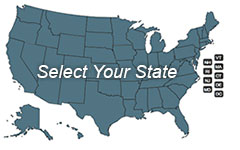Mental Health Counseling Licensure in Arkansas

Arkansas mental health counselors are licensed as Licensed Professional Counselors and granted a specialization in mental health counseling; at this point, they may be called Arkansas Clinical Mental Health Counselors. The specialty credential will not be earned until the candidate has passed three examinations. A period of supervised practice will also be required. The counselor will hold Licensed Associate Counselor status while working to meet the experience requirement.
- Featured Online CACREP Accredited Master's in Counseling Program Options:
- Liberty University, a non-profit university, offers a CACREP accredited online Master of Arts in Clinical Mental Health Counseling. Click here to learn more about Liberty University and their Master of Arts in Clinical Mental Health Counseling.
- Prepare for counseling licensure in as few as 27 months with Pepperdine’s online MA in Clinical Psychology - no GRE required. The program is top ranked for return on investment (ROI) by OnlineU.
- Southern New Hampshire University (SNHU) offers a CACREP accredited online BA in Psychology - Mental Health. Click here to learn about the counseling programs at SNHU.
- Grand Canyon University offers an M.S. in Clinical Mental Health Counseling with an Emphasis in Childhood and Adolescence Disorders; Christian Counseling; Marriage & Family Therapy and Trauma.
- Sacred Heart University's Master of Arts in Clinical Mental Health Counseling is offered online and was developed based off CACREP standards to prepare graduates for licensure in most states. Click here to learn more about Sacred Heart University and the online Master of Arts in Clinical Mental Health Counseling.
Select an Arkansas Mental Health Counselor Licensure Topic:
- Licensed Professional Counselor Education Requirements in AR
- LAC Examination Requirements
- Application Process
- LPC Practice/Supervision Requirement
- Contacts and Additional Information
Educational Requirements
A student must enroll in a mental health counseling program at the master’s level or higher. The degree will be a minimum of 60 graduate semester hours. Education is to meet CACREP standards (http://abec.arkansas.gov/aboutUs/Documents/Rules%20EFFECTIVE%20NOV%207%202011.pdf).The student will need to earn grades of A or B (http://abec.arkansas.gov/LicensureforanArkansas%20CounseloorTherapist.pdf).
The student will need at least three semester hours in each of the following:
- Helping relations
- Human growth and development
- Abnormal psychology
- Social and cultural diversity
- Professional identity
- Family and relationship
- Psychopharmacology
- Assessment
- Group work
- Career development
- Research and program development
Assessment coursework is to cover use of the DSM and ICD.
The student will need at least nine semester hours of practicum and internship.
LAC Examination Requirements
After completing degree requirements, the graduate can apply for licensure as a Licensed Associate Counselor. The candidate will need to pass the National Counselor Examination (NCE) and a state oral examination.
A candidate who fails an NCE attempt is allowed to retest after three months. A candidate who fails twice, however, will need to wait two years and submit another application.
LPC Practice/Supervision Requirement
The Board requires three years of post-master supervised practice, or 3,000 client contact hours, at least in some instances. However, passage of the National Clinical Mental Health Counseling Examination (NCMHCE) can substitute for the final 1,000 hours. (This is something that a candidate who is seeking mental health counseling specialization will eventually need to pass.)
Education beyond the master’s level can also reduce the requirement. 30 semester hours of post-master study may be credited as one year. All candidates will complete at least one year of supervised practice, regardless of their educational level.
The experience period is divided into three 1,000 hour phases (https://abec.statesolutions.us/applicants/). All candidates begin at Phase I; no substitutions are credited toward Phase I requirements. Supervision ratios will decrease as the LAC progresses through phases.
Group supervision may count for no more than half of the hours. A group supervision plan must be on file with the Board. The LAC will be subject to six month evaluations.
The Board places limits on the number of indirect service hours that may be credited. Reporting forms and other supervision-related resources can be found on the ABEC site (https://abec.statesolutions.us/applicants/). Candidates can find contact information for approved supervisors under the “Supervision & General Information” heading.
An individual who moves into the state already having completed supervision hours must have them approved.
The Application Process
Candidates can submit application materials when they are in the final semester of their programs. Application materials can be downloaded from the ABEC site (https://abec.statesolutions.us/). The student will provide some form of academic documentation when making initial application; a transcript that shows degree conferral must be sent at a later date. Candidates are asked to refer to the Procedures Manual of the Council on Accreditation of Counseling and Related Educational Programs when filling out course worksheets.
The applicant will need several letters of reference. (The Board notes that although only three are required, it can be a good idea to request more.)
A typed letter of intent is required for both associate and professional level practice. The candidate will describe the intended practice, including anticipated counseling methods and populations served.
A criminal background check is also required. However, the applicant will wait for instructions from the Board.
The candidate will wait for authorization before registering for the NCE. The $195 registration fee will be paid directly to the NBCC. It may four weeks before the NBCC confirms eligibility and allows the candidate to schedule an examination.
The NCE is administered in Little Rock and Fayetteville and at other computerized testing centers around the nation. State-specific testing information can be accessed through the ABEC site (http://abec.arkansas.gov/ExamInfo/Pages/default.aspx) and through the NBCC site (http://www.nbcc.org/directory/AR).
After the Board receives official word that the candidate has passed the NCE, he or she can be scheduled for an oral examination. The candidate may use the ensuing time to find a supervisor and prepare a supervision plan, though the plan will not go into effect until the oral examination has been passed.
The candidate will also need to prepare an incapacitation/ termination plan in advance of the oral examination. (Candidates who have not yet secured positions will write plans on personal letterhead and revise them later.)
The ABEC website includes a description of the application and licensing process, with tips for shortening the timeline (https://abec.statesolutions.us/applicants/).
Initial application costs $100. There is an upgrade fee of $50 when LPC requirements have been met.
Candidates are expected to note whether they intend to apply for a specialization when they first submit an application form. (There is an option, though, to apply for specialties at a later date.)
Petition forms for phase and license change can be found in the supervision section of the Board site. Mental health counseling candidates will petition to take the NCMHCE after completing Phase II of supervision (https://abec.statesolutions.us/licensees/). Supervisor recommendation is required.
Counselors and counseling candidates who seek the mental health specialization are directed to request application materials from the National Board for Certified Counselors (NBCC). The registration and scheduling process is the same as it is for the NCE.
Additional Information
The Arkansas Board of Examiners in Counseling can be found on the web at http://abec.arkansas.gov/Pages/default.aspx. Text of laws and rules can be accessed online (https://abec.statesolutions.us/applicants/). Applicants are encouraged to email the Board if they have questions about the process.
Additional professional resources can be found on the site of the Arkansas Mental Health Counselors Association (http://www.armhca.org). ArMHCA is not involved with the licensing process, but is affiliated with the American Mental Health Counselors Association and the American Counseling Association.
Find Mental Health Counselor Licensure Requirements in Your State:

Learn about becoming a Mental Health Counselor in your state:
To View Full U.S. Map Click Here.